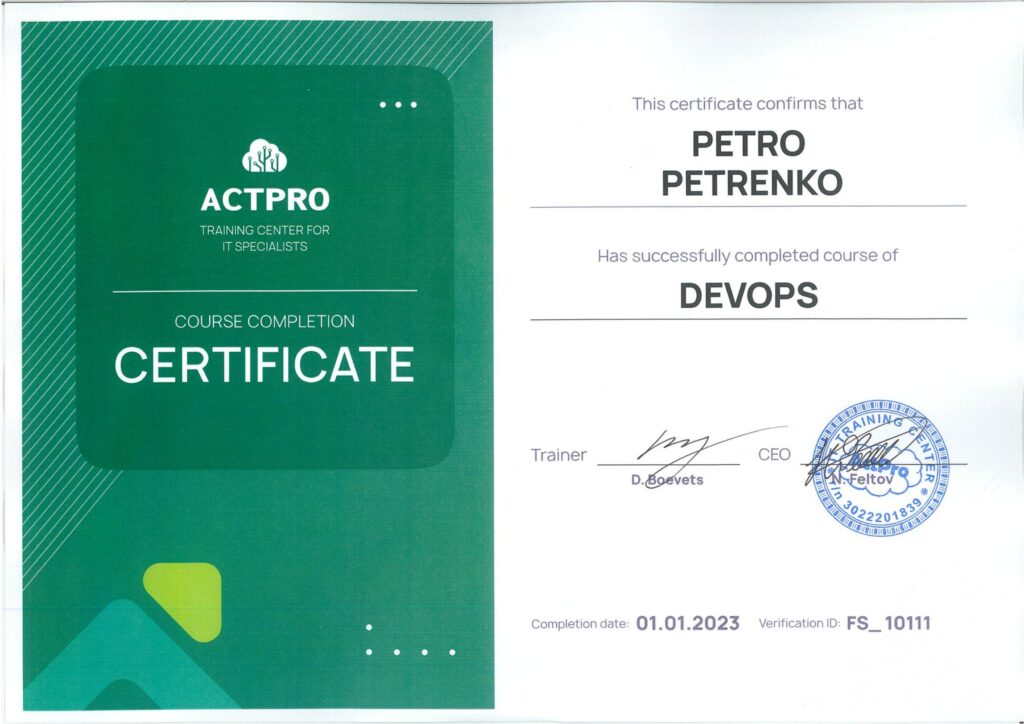TOP CHOICE
NEW COURSE
FULL ONLINE
WE PROVIDE RECORDINGS OF ALL LESSONS
DevOps course
There are still a few places left: 12
For those who want to upgrade their skills and get a new profession in an IT company.


Help
with job search

Linux skills, understanding of TCP/IP required


There are only 15 students in the group
Start of classes
Thursday
12.10
Course fee
Payment by installments
4,000₴/month
a 5% discount
₴21 000

Relevance of the profession
DevOps Engineer is a specialist who is responsible for the effective interaction of the development team and other information technology service specialists.
Its main goal is to help the team create and update software products and services faster. The course covers the basic tools:
Linux, AWS, Git, Apache, Nginx, Postgres, Ansible, Docker, Kubernetes.
What tools are we learning?

We used to be like everyone else -
conducted classes for 14 people in a group. But we noticed that the percentage of employed students has decreased.
This can be explained by several reasons: firstly, unfortunately, the situation in the country, and secondly, there are many one-day courses that promise a lot but deliver little.
And now everything is different
We have decided to radically change the training policy of our courses and make learning as effective as possible.
Therefore, we offer semi-individual training in a group of 7 people.
Students receive more materials and tools
They practice and learn the material better
Get their dream job in the shortest possible time

Our students work in international IT companies

After completing the course you will:
Deploy the on-premises or cloud infrastructure in AWS that you need to keep your software development up-to-date;
Use the most popular software tools and practices, namely Ansible, Docker, GitLab CI/CD, Nginx, Postgres, ELK, Kubernetes;
Maintain and optimize existing projects;
You will be able to successfully answer the main questions of technical interviews;
And much more.
Course program:
- Overview and purpose of the course;
- The DevOps methodology;
- Overview of the main tools and practices;
- Working with Vagrant;
- Boot process, Linux kernel functions, working with bash, regular expressions, awk;
- File system, POSIX standard, inode, soft and hard links, programs for working with files;
- Process control, signals, pseudo-file system /proc, programs ps, top, htop, atop;
- Systemd, working with unit services and timers, analyzing and finding errors with journalctl;
- Bash scripting, environment variables, branching, loops, user interaction;
- Network, netplan, ufw, SSH, key management, scp, rsync, NTP.
- Introduction to cloud infrastructure and basic services;
- Work with IAM, VPC, EC2, S3, and Route53 services;
- Creating resources in AWS with Terraform;
- CloudWatch monitoring;
- Cost management and optimization;
- The basics of working with git;
- Push, fetch, pull;
- Git flow;
- Cloning repo, branches, merging branches, pull requests;
- Working with Gitlab.
- Http, https, dns protocols;
- Understanding of apache and nginx architecture;
- LAMP (Linux, Apache, MySQL, PHP) stack;
- Load balancing using NGINX;
- Access and logging lists.
- Relational SQL;
- Introduction to PostgreSQL;
- Physical and logical levels;
- Types of replication and device;
- Backup and restore;
- Introduction to configuration management;
- Templates, handlers, dynamic inventory, vault, tags;
- Roles, cycles, conditions, filters;
- Best practices.
- An introduction to containerization;
- The Docker device;
- Dockerfile, docker registry, doker-compose;
- Safety of containers.
- Introduction to CI/CD;
- The Gitlab CI;
- Uninterrupted supply of software;
- Building a pipeline in GitLab.
- Introduction to Kubernetes, architecture, and main components;
- Deployment of a Kubernete cluster;
- Interaction with the cluster using the API. Working with kubectl;
- Introduction to and operations with namespaces;
- Create and manage Pods, Deployments, ReplicaSets;
- Create and manage Services, Ingress, Controllers;
- Introduction to the Helm Charts;
- Using Secrets to work with confidential information.
- Infrastructure monitoring in Prometheus;
- Collecting logs in ELK.
- Types of companies and why you need to know
- How to look for a job
- Useful resources and social networks
- The structure of a resume
- Where to start
- What is better not to indicate
- Cover letter
- Called for an interview, what to do
- Interview Day.
- Discussion of issues that have arisen regarding the finished CV
- Pitch (structure and logic)
- Hiring process in companies
- Common questions at interviews
- How to get rid of fears.
Sign up for this course now!

Devops/Information Security Officer
Dmytro Boevets
Teacher since 2017 (DevOps lectures).
Construction of software development automation processes.
A deeper understanding of the aspects and tools of working with OC Linux.
He worked as a network engineer and cyber security specialist

Vladyslav
Agapeev
The DevOps course is just cool, I upgraded my skills on it, found a lot of other information I needed, immersed myself in the functionality, easily passed 3 interviews and already work in a well-known company. As a system administrator, learning was easy for me, but it was clearly difficult for most of my classmates. Dima is a cool specialist and conveyed knowledge in understandable language. Thanks for the new profession.
The DevOps course is just cool, I upgraded my skills on it, found a lot of other information I needed, immersed myself in the functionality, easily passed 3 interviews and already work in a well-known company. As a system administrator, learning was easy for me, but it was clearly difficult for most of my classmates. Dima is a cool specialist and conveyed knowledge in understandable language. Thanks for the new profession.

Alexei
Palagin
I studied online, I thought I wouldn’t make it, but thanks to the teachers, everything worked out for me. It is immediately clear that they are not just lecturers, but also professionals. During lectures, all questions are answered in detail and with examples, as well as additionally in chats. The program is clear, there is no water, there is a lot of practice. I am currently going through interviews and hope for a quick job.
I studied online, I thought I wouldn’t make it, but thanks to the teachers, everything worked out for me. It is immediately clear that they are not just lecturers, but also professionals. During lectures, all questions are answered in detail and with examples, as well as additionally in chats. The program is clear, there is no water, there is a lot of practice. I am currently going through interviews and hope for a quick job.

Igor
Udodov
Actpro courses are high-quality training, an individual approach to students, a good presentation of the material, an up-to-date training program! Successfully retrained from system administrator to Devops engineer. I changed my job to a more interesting and promising one.
Actpro courses are high-quality training, an individual approach to students, a good presentation of the material, an up-to-date training program! Successfully retrained from system administrator to Devops engineer. I changed my job to a more interesting and promising one.

Denis
Ponomarenko
Worked for a long time as a system administrator, but this year decided to upgrade my skills to a DevOps engineer. I found your courses on the Internet and did not regret it. Dmytro is an excellent teacher and a specialist in his field. While studying online, no trifles arose, all questions were answered quickly and clearly. At the moment, I already work as a DevOps engineer thanks to you. Thanks to the ActPro team! I recommend your courses to my friends!
Worked for a long time as a system administrator, but this year decided to upgrade my skills to a DevOps engineer. I found your courses on the Internet and did not regret it. Dmytro is an excellent teacher and a specialist in his field. While studying online, no trifles arose, all questions were answered quickly and clearly. At the moment, I already work as a DevOps engineer thanks to you. Thanks to the ActPro team! I recommend your courses to my friends!
Frequently asked questions
We think so, if you devote at least 10 hours a week to classes, do your homework, and communicate with your mentor. Then in 5 months you will be able to master DevOps engineerskills,you will collect a portfolio of projects and start your career path.
Linux skills at the LPIC-1 level. Understanding and practical skills of working with the TCP/IP protocol stack, or taking our System Administration course.
It is possible, in order to secure your place in the group, you need to pay 1,000 hryvnias before the start of training, then 4,000 hryvnias at the first lesson and 3 payments of 4,000 hryvnias during the training.
We make a video recording of each class, and you will also have access to the class summary and other course materials.
All lecturers are practitioners at least at the Senior level, with at least 5 years of experience in leading companies.
You can contact the administrator by filling out the form on the website, or call any of the contact numbers or write to the messenger listed on the website. If possible, you can also come to our office to discuss all the details of the course. You can also request a prepayment invoice online.









